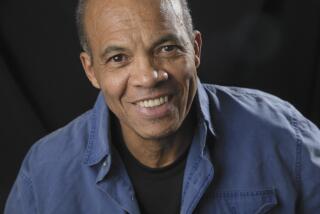âLove and Obstacles: Storiesâ by Aleksandar Hemon
Love and Obstacles
Stories
Aleksandar Hemon
Riverhead: 210 pp., $25.95
Early in Aleksandar Hemonâs excellent novel âThe Lazarus Project,â a character named Mary asks her husband how he could write about a Jew when he isnât one. The question reveals one of many doubts Mary has about her husbandâs abilities as a writer. It could be considered a throwaway comment, but Maryâs question, in fact, cuts close to one of Hemonâs central concerns as a fiction writer: how to write authentically about traumas one has not personally experienced.
For Hemon, a Bosnian who found himself marooned in Chicago at the start of the siege of Sarajevo in 1992, this very personal question recurs throughout his work. His protagonists are often writers, Bosnian expats who were cut off from their home country and must contend with an unfamiliar American landscape. Itâs a harrowing position to be in, divorced from family and country, knowing that loved ones are dodging snipers and mortar rounds thousands of miles away. Compounding the torment is that the Americans of these stories, who are frequently welcoming to foreigners, know little about the world outside their borders.
âLove and Obstacles,â a collection of linked stories, contains more of these Hemonian men. They are similar to their authorâs past creations, and they undergo similar trials, straddling the border between comedy and tragedy, but Hemon manages to extract new life out of his well-sculpted archetype.
The narrator of these stories, an unnamed Bosnian of Ukrainian extraction, struggles to understand what it must have been like in wartime Sarajevo. Bogdan, another Ukrainian-Bosnian stuck in Chicago, tells the narrator, âYou will never know what you escaped. . . . You will never know how lucky you are.â Bogdan, usually a bumbling man but here invested with the hard-won authority of a survivor, goes on to present a horrific list of atrocities witnessed. The narrator may be among the lucky few to have escaped the devastation, but this knowledge causes him to feel stranded in a maddening purgatory between America and Bosnia. Like one of Roberto BolaĂąoâs creations, the narrator is a writer seeking salvation through writing, and while he has never experienced war -- he played at it as a child in a series of increasingly dangerous, disturbing games -- it is through his writing that he can best come to understand the war that has created a vacuum in his life.
It follows, then, that the narrator at once admires and despises Dedo, a prominent Bosnian poet, and Macalister, a Pulitzer Prize-winning American writer who, after his Vietnam War experience and a plunge into alcoholism, has found critical success and an unnerving Buddhist calm. Both men survived war, and both have apparently transmuted war trauma into literary triumph.
These are stories of metaphysical dislocation before and after the inevitable physical one. They are also about the strange unreality of communist Yugoslavia, best depicted through the prism of the narratorâs father, who âwas deeply and personally offended by anything he deemed unreal.â
âEverything,â a story ostensibly about the 17-year-old narratorâs trip into a small Bosnian town to buy a freezer chest, turns into something much more. The boy binges on alcohol and tries to find a woman, anyone willing, to relieve him of his virginity. Pursuing a married American tourist who locks herself in her hotel room, the narrator says: âSwaying before the cruelly and unnecessarily closed door, I raised my hand to knock and clarify to Elizabeth that, yes, I was in love with her, and that, no, I didnât mind that she was married. . . . I heard them murmuring conspiratorially, like a husband and wife, and I recognized that love was on the other side, and I had no access to it.â
It is a perfect distillation of youthful lust, yet thatâs not all, for we are reminded that this moment comes âjust before the war, in the relatively rosy time when we were euphoric with the imminence of disaster.â The fulcrum of violence always looms.
Hemonâs talent for diction -- snowflakes âabseiling down an obscure silky rope,â a âcaliginousâ mountain -- can carry passages, but he occasionally becomes too deliberately clever: an ambassador and spouse are described as âHis Excellency and his excellent wifeâ; later, in the same story, a gorgeous description of a smoke-spewing volcano is undercut by the trite observation that âthe earth appeared unearthly.â
When the narrator appropriates Dedoâs poetry to seduce women, he comes to wonder whether or not heâs a literary impostor. Clearly, Hemon is not, and his stories do much more than âsimplify the incomprehensibleâ -- war and genocide. At their best, these stories establish oblique angles of approach to near-overwhelming concerns, and they leave us vested with images not easily shaken off.
Silverman is a Los Angeles-based critic and contributing online editor to Virginia Quarterly Review.
More to Read
The biggest entertainment stories
Get our big stories about Hollywood, film, television, music, arts, culture and more right in your inbox as soon as they publish.
You may occasionally receive promotional content from the Los Angeles Times.










